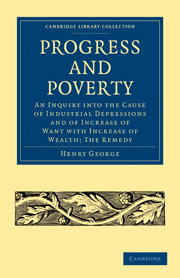 Progress and Poverty
Progress and Poverty Book contents
- Frontmatter
- PREFACE TO FOURTH EDITION
- Contents
- INTRODUCTORY
- BOOK I WAGES AND CAPITAL
- BOOK II POPULATION AND SUBSISTENCE
- BOOK III THE LAWS OF DISTRIBUTION
- Chapter I The inquiry narrowed to the laws of distribution—necessary relation of these laws
- Chapter II Rent and the law of rent
- Chapter III Interest and the cause of interest
- Chapter IV Of spurious capital and of profits often mistaken for interest
- Chapter V The law of interest
- Chapter VI Wages and the law of wages
- Chapter VII Correlation and co-ordination of these laws
- Chapter VIII The statics of the problem thus explained
- BOOK IV EFFECT OF MATERIAL PROGRESS UPON THE DISTRIBUTION OF WEALTH
- BOOK V THE PROBLEM SOLVED
- BOOK VI THE REMEDY
- BOOK VII JUSTICE OF THE REMEDY
- BOOK VIII APPLICATION OF THE REMEDY
- BOOK IX EFFECTS OF THE REMEDY
- BOOK X THE LAW OF HUMAN PROGRESS
- CONCLUSION
- INDEX
Chapter VIII - The statics of the problem thus explained
Published online by Cambridge University Press: 07 September 2011
- Frontmatter
- PREFACE TO FOURTH EDITION
- Contents
- INTRODUCTORY
- BOOK I WAGES AND CAPITAL
- BOOK II POPULATION AND SUBSISTENCE
- BOOK III THE LAWS OF DISTRIBUTION
- Chapter I The inquiry narrowed to the laws of distribution—necessary relation of these laws
- Chapter II Rent and the law of rent
- Chapter III Interest and the cause of interest
- Chapter IV Of spurious capital and of profits often mistaken for interest
- Chapter V The law of interest
- Chapter VI Wages and the law of wages
- Chapter VII Correlation and co-ordination of these laws
- Chapter VIII The statics of the problem thus explained
- BOOK IV EFFECT OF MATERIAL PROGRESS UPON THE DISTRIBUTION OF WEALTH
- BOOK V THE PROBLEM SOLVED
- BOOK VI THE REMEDY
- BOOK VII JUSTICE OF THE REMEDY
- BOOK VIII APPLICATION OF THE REMEDY
- BOOK IX EFFECTS OF THE REMEDY
- BOOK X THE LAW OF HUMAN PROGRESS
- CONCLUSION
- INDEX
Summary
We have now obtained a clear, simple, and consistent theory of the distribution of wealth, which accords with first principles and existing facts, and which, when understood, will commend itself as self-evident.
Before working out this theory, I have deemed it necessary to conclusively show the insufficiency of current theories; for, in thought, as in action, the majority of men do but follow their leaders, and a theory of wages which has not merely the support of the highest names, but is firmly rooted in common opinions and prejudices, will, until it has been proved untenable, prevent any other theory from being even considered, just as the theory that the earth was the center of the universe prevented any consideration of the theory that it revolves on its own axis and circles round the sun, until it was clearly shown that the apparent movements of the heavenly bodies could not be explained in accordance with the theory of the fixity of the earth.
There is in truth a marked resemblance between the science of political economy, as at present taught, and the science of astronomy, as taught previous to the recognition of the Copernican theory. The devices by which the current political economy endeavors to explain, the social phenomena that are now forcing themselves upon the attention of the civilized world may well be compared to the elaborate system of cycles and epicycles constructed by the learned to explain the celestial phenomena in a manner according with the dogmas of authority and the rude impressions and prejudices of the unlearned.
- Type
- Chapter
- Information
- Progress and PovertyAn Inquiry into the Cause of Industrial Depressions and of Increase of Want with Increase of Wealth; The Remedy, pp. 198 - 202Publisher: Cambridge University PressPrint publication year: 2009First published in: 1881
